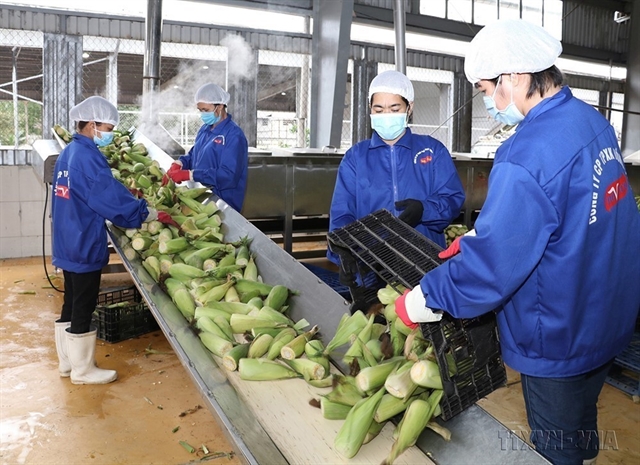WB warns of heightened risks looming
VIETNAM, May 17 -

Workers during a shift at an animal feed factory in northern Ninh Bình Province. — VNA/VNS Photo Thống Nhất
HÀ NỘI — While Việt Nam's economic recovery was gaining momentum, the Government must pay more attention to "inflation and heightened risks of weaker global demand and supply disruptions to economic prospects", said a World Bank report on the South East Asian economy for May.
Major disruptions to look out for include the uncertainty due to the ongoing Russia-Ukraine conflict and supply issues caused by lockdowns in China. The report said if higher inflation persists in the medium term, the economy should be allowed to adjust to higher prices with the authorities incentivising investments to increase productivity and aggregate supply. To mitigate risks to export performance, diversifying trade partners would be a prudent strategic consideration.
During the month of April, the country's industrial production index grew by 9.4 per cent, comparable to the pre-pandemic level. Manufacturing of apparel, footwear, electronics, electrical equipment, and metal products were the most dynamic sub-sectors, registering double-digit growth rates. Visits to restaurants, coffee shops, shopping malls and other retail and recreation establishments also returned to the pre-pandemic level as the declining number of new COVID-19 cases and deaths (Việt Nam recorded fewer than 5,000 new COVID-19 infections with fewer than 10 deaths daily in early May) boosted people’s confidence to resume economic and social activities.
Exports accelerated from 17.0 per cent in March to 25.2 per cent in April while import growth edged up from 14.6 per cent to 16.5 per cent year-on-year. Export performance was relatively broad-based across major products and markets. Imports grew more slowly than exports, largely reflecting the slowdown in imports from China caused by lockdowns to contain the recent surge in COVID-19 infections, according to the report.
Meanwhile, FDI commitment reached US$1.9 billion in April, 12.6 per cent lower than the same period last year. In light of current global conflicts and tightening financial conditions, heightened global uncertainty may have made investors more prudent.
The report said the price increases indicate both supply and demand side factors at play. On the supply side, there was some passthrough from global commodity prices and higher transport costs to domestic prices of both food and non-food products. — VNS
